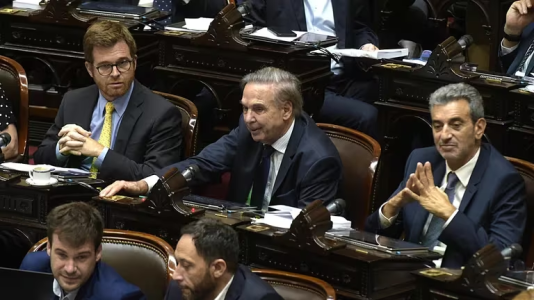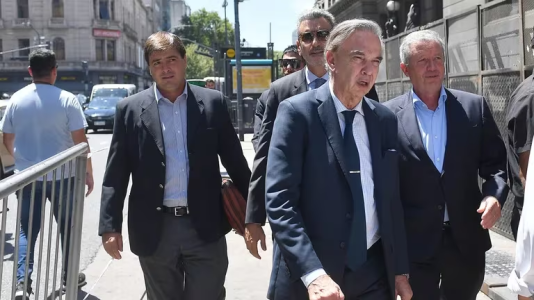Pichetto spoke about the brakes on the Omnibus Law: “We are stuck on two sections, nonsense” - Infobae

Source:

 www.infobae.com
www.infobae.com
February 08, 2024
The deputy of Hacemos Coalión Federal affirmed that the Government must “restart the dialogue” and that the project was important “symbolically” for the ruling party. He called for an end to “aggression and coercion”

Pichetto request for a minute of silence due to the death of Piñera - Treatment in particular of the bases law (Gustavo Gavotti)
The Government suffered its first parliamentary setback with the brakes on the Omnibus Law after the debate in particular of the norm that had been approved in general last week was stopped. This situation triggered countless criticisms from the ruling party for the “dialogue” deputies, many of whom were accused of being “traitors” and even mentioned in a list disseminated on the social network account X of the President's Office.
One of the great protagonists of the marathon sessions of recent days in the Chamber of Deputy was Miguel Ángel Pichetto , one of the “historical” members of Congress. And today, the man from Rio Negro left another clear message regarding what happened and what may come in the future.
According to the head of the We Make Federal Coalition bloc, the law was not approved in particular because of “nonsense” and the lack of dialogue between the Executive Branch and the governors.
“We always try to help, but there was no desire to deepen a dialogue with the governors either . That was an issue that the Government should have tried to alleviate and in particular to be able to vote on the missing articles. We are stuck on two paragraphs, nonsense . The law suited the Government,” said Pichetto.
In dialogue with journalist Jorge Lanata on Radio Miter, the former candidate for vice president in 2019 said that “it would have been very valuable” if Congress had approved the project, which he described as “very important, but not vital” for the Government since “the fiscal part was already out,” in relation to the articles that Minister Luis Caputo had released to facilitate the approval of the norm.
Although Pichetto said that now, after returning the project to committee, “we have to start from scratch,” he did not rule out that the President chooses to divide the initiative into different parts so that Congress can treat them separately.
When trying to explain the reason for the failure of Tuesday's session, Pichetto attributed it to the lack of calling the governors. “We had to try to have moved forward sooner. "We had made a fourth intermission on Friday to resolve the issues that were still in doubt for particular treatment, but there was no call to the governors, the Government did not want to give that image ," he stated.

Miguel Ángel Pichetto (Maximiliano Luna)
Looking ahead to what follows, Pichetto asked to “get out of aggression and coercion” and “try to make a federal fiscal agreement between the provinces and the Nation and that this can be transferred to Congress in a series of laws that the Government interests you... Let's try to reestablish a link of institutional dialogue and tranquility so that society can understand that Congress is not an obstacle."
“I think the law could have passed and it was not such a dramatic event to withdraw it . But you can never go back, you can't undo the past. We have to see how the story continues. The President has to, starting March 1, send his agenda. And the aggression must stop, because that is of no use,” Pichetto added.
The deputy also warned about the consequences of calling a plebiscite, one of the alternatives that the Government uses to promote the law: " Many governments were shipwrecked in that plebiscite or popular consultation," he warned, and recalled that, in Argentina, it was only successful the one organized by Raúl Alfonsín in 1984, to decide if Argentina would accept the Treaty of Peace and Friendship with Chile regarding the Beagle Channel , an area of border dispute.
Pichetto also rejected the attack from the ruling party on the “dialogue” deputies who did not vote for some of the articles contained in the Omnibus Law. “I do not share that concept applied to politics. I want to give the example of Randazzo, Massot, and Monzó, who had a collaborative position and voted against two paragraphs. We have to process this in another way. Stigmatization is not good either . I am on the list of the good ones, but many times I was on the list of the bad ones…” he stressed.

Source:
Pichetto habló sobre el freno de la Ley Ómnibus: “Nos trabamos en dos incisos, una tontería”
El diputado de Hacemos Coalición Federal afirmó que el Gobierno debe “retomar el diálogo” y que el proyecto era importante “simbólicamente” para el oficialismo. Pidió terminar con “la agresión y la coerción”
February 08, 2024
The deputy of Hacemos Coalión Federal affirmed that the Government must “restart the dialogue” and that the project was important “symbolically” for the ruling party. He called for an end to “aggression and coercion”

Pichetto request for a minute of silence due to the death of Piñera - Treatment in particular of the bases law (Gustavo Gavotti)
The Government suffered its first parliamentary setback with the brakes on the Omnibus Law after the debate in particular of the norm that had been approved in general last week was stopped. This situation triggered countless criticisms from the ruling party for the “dialogue” deputies, many of whom were accused of being “traitors” and even mentioned in a list disseminated on the social network account X of the President's Office.
One of the great protagonists of the marathon sessions of recent days in the Chamber of Deputy was Miguel Ángel Pichetto , one of the “historical” members of Congress. And today, the man from Rio Negro left another clear message regarding what happened and what may come in the future.
According to the head of the We Make Federal Coalition bloc, the law was not approved in particular because of “nonsense” and the lack of dialogue between the Executive Branch and the governors.
“We always try to help, but there was no desire to deepen a dialogue with the governors either . That was an issue that the Government should have tried to alleviate and in particular to be able to vote on the missing articles. We are stuck on two paragraphs, nonsense . The law suited the Government,” said Pichetto.
In dialogue with journalist Jorge Lanata on Radio Miter, the former candidate for vice president in 2019 said that “it would have been very valuable” if Congress had approved the project, which he described as “very important, but not vital” for the Government since “the fiscal part was already out,” in relation to the articles that Minister Luis Caputo had released to facilitate the approval of the norm.
Although Pichetto said that now, after returning the project to committee, “we have to start from scratch,” he did not rule out that the President chooses to divide the initiative into different parts so that Congress can treat them separately.
When trying to explain the reason for the failure of Tuesday's session, Pichetto attributed it to the lack of calling the governors. “We had to try to have moved forward sooner. "We had made a fourth intermission on Friday to resolve the issues that were still in doubt for particular treatment, but there was no call to the governors, the Government did not want to give that image ," he stated.

Miguel Ángel Pichetto (Maximiliano Luna)
Looking ahead to what follows, Pichetto asked to “get out of aggression and coercion” and “try to make a federal fiscal agreement between the provinces and the Nation and that this can be transferred to Congress in a series of laws that the Government interests you... Let's try to reestablish a link of institutional dialogue and tranquility so that society can understand that Congress is not an obstacle."
“I think the law could have passed and it was not such a dramatic event to withdraw it . But you can never go back, you can't undo the past. We have to see how the story continues. The President has to, starting March 1, send his agenda. And the aggression must stop, because that is of no use,” Pichetto added.
The deputy also warned about the consequences of calling a plebiscite, one of the alternatives that the Government uses to promote the law: " Many governments were shipwrecked in that plebiscite or popular consultation," he warned, and recalled that, in Argentina, it was only successful the one organized by Raúl Alfonsín in 1984, to decide if Argentina would accept the Treaty of Peace and Friendship with Chile regarding the Beagle Channel , an area of border dispute.
Pichetto also rejected the attack from the ruling party on the “dialogue” deputies who did not vote for some of the articles contained in the Omnibus Law. “I do not share that concept applied to politics. I want to give the example of Randazzo, Massot, and Monzó, who had a collaborative position and voted against two paragraphs. We have to process this in another way. Stigmatization is not good either . I am on the list of the good ones, but many times I was on the list of the bad ones…” he stressed.

